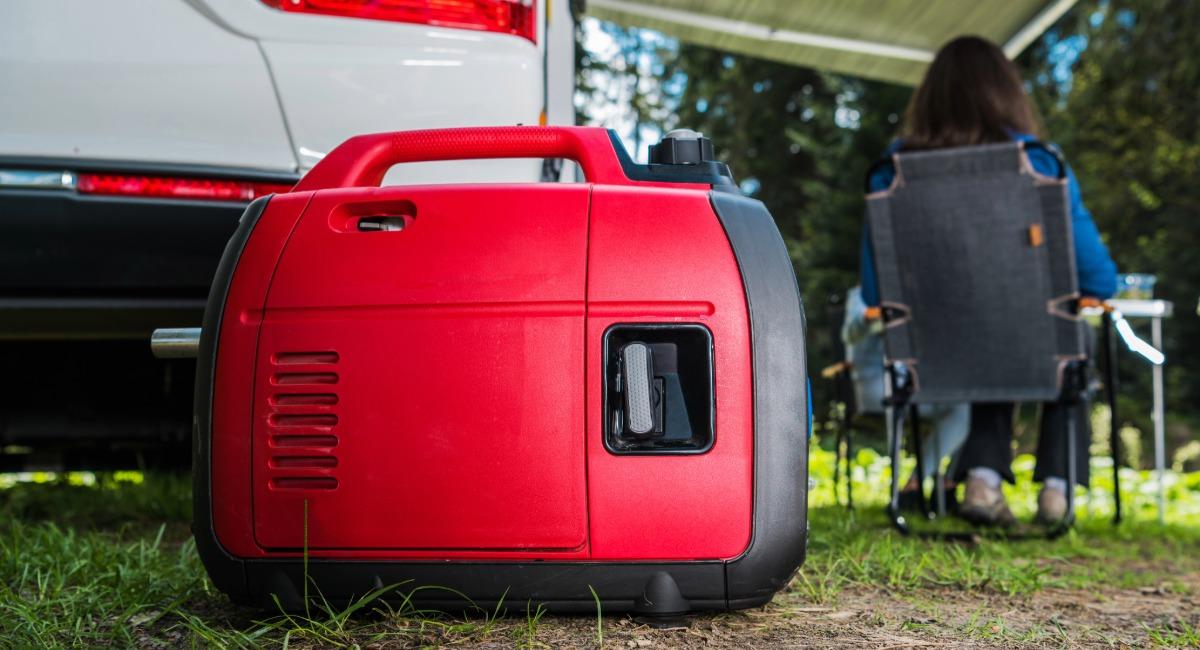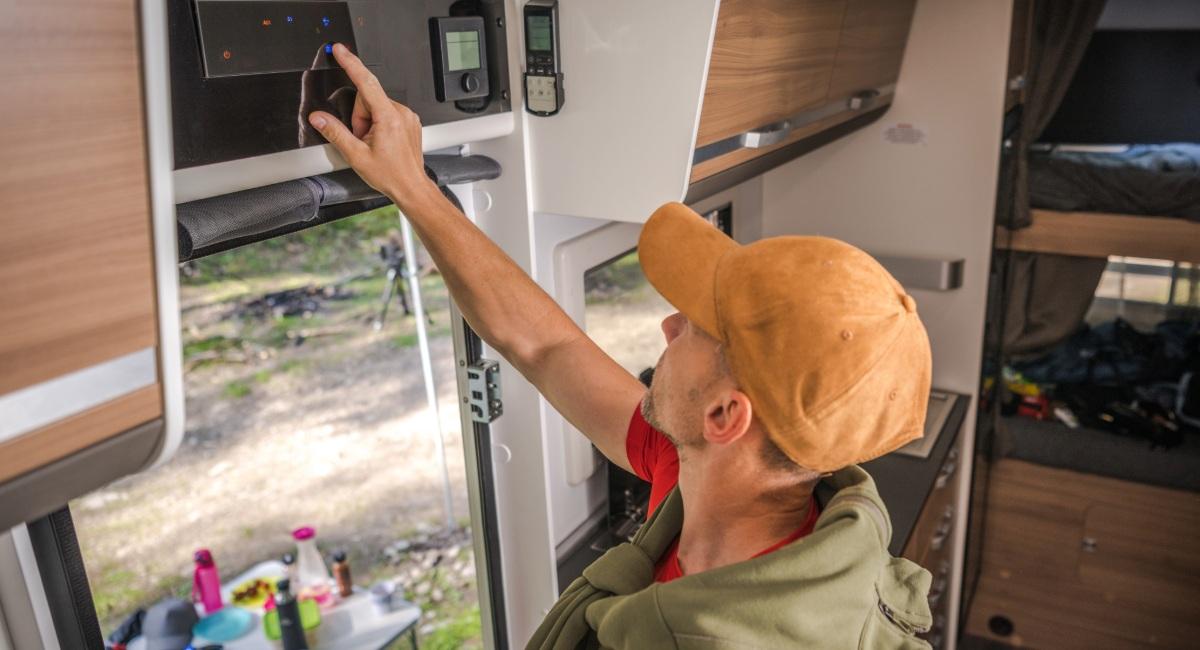
TL;DR: Choosing the right RV generator comes down to knowing your rig’s amperage and how much power you actually use. Most RVers get by with 3,000–4,000 watts, but running big appliances like a 15,000 BTU AC means you’ll need more. Start by listing what you’ll run at the same time: essentials first, comfort items second. Avoid going oversized—it just adds noise, weight, and cost.
Whether you’re boondocking or plugged in at a campground, a well-sized generator keeps things running without overkill. Factor in your camping style, built-in power, and budget. The goal? Reliable power that won’t weigh you down, literally or financially.
Your generator size depends on your RV's electrical system capacity and your actual power consumption during typical use.
The math is straightforward once you know your RV's amperage. Here's how to nail it down without overthinking it.
Your RV runs on either 30-amp or 50-amp service—this is your power ceiling. You'll find this info on your shore power cord or in your owner's manual.
30-amp RVs typically require between 2,500 and 4,000 watts depending on the appliances you use. A 3,000 to 3,600-watt generator is generally the recommended minimum if you're running an air conditioner. Going larger than necessary may add cost and weight.
50-amp RVs can theoretically handle up to 12,000 watts, but most dual air conditioner rigs typically require generators sized between 5,500 and 8,000 watts to run smoothly.
Skip the equations. Think about a typical day in your RV. Are you running the AC while cooking dinner and charging devices? Or just keeping the essentials humming?
Essential appliances (always running):
Comfort add-ons (used occasionally):

Air conditioners are power-hungry beasts that typically determine your minimum generator size—plan for 3,000+ watts for smaller units.
Your AC unit is probably the biggest power draw in your rig. Here's the breakdown:
13,500 BTU units usually require about 2,800 to 3,500 watts to start, with running wattage ranging from 1,200 to 1,700 watts. A solid 3,500-watt generator handles this with some power left over.
15,000 BTU units typically need 3,500 to 4,000 watts to start and between 1,800 and 2,000 watts to run. You'll want at least a 4,000-watt generator, maybe bigger if you're running other stuff simultaneously.
Dual AC setups mean you're looking at 6,000+ watts minimum. Time to consider parallel generators or a larger single unit.
According to EcoFlow's comprehensive RV AC guide, most RV AC units use between 500W-2,700W depending on their size, but the startup wattage can be significantly higher—sometimes double the running wattage.
Both options get the job done, so it just depends on how you camp. Portable generators offer more flexibility, while built-ins bring convenience (with a few trade-offs).
If your RV came with a built-in generator, you might already be set. These typically range from 3,000 to 12,000 watts and commonly run on propane, diesel, or gasoline.
The good: Always there, quiet compartment mounting, automatic start options, integrated with your RV's electrical system.
The not-so-good: Expensive to repair, fixed location limits noise management, harder to service, and you can't move it away from camp.
Portable units give you flexibility. Set them downwind, share with neighbors, or use them for home backup power.
Weight matters: Every pound affects your fuel economy. A 3,000-watt portable typically weighs 60-80 pounds versus 150+ for built-ins.
Noise considerations: You can position portables for minimal noise impact—your neighbors will thank you.
Just like any other RV component, your generator needs regular maintenance to stay reliable. Proper RV maintenance includes running it under load for 30 to 60 minutes once a month to lubricate seals and keep your fuel system healthy.
Off-grid living is all about balance (power, fuel, and peace and quiet). If you're boondocking and planning to run an air conditioner, look for a generator in the 2,500 to 3,000-watt range. That gives you enough muscle without overdoing it. Smaller 2,000-watt units often fall short when it comes to starting or sustaining an AC.
When you're off-grid, your generator becomes your all-in-one power station. Every watt matters, so you'll need to plan with purpose.
Here’s a smart priority order:
Generator Runtime and Fuel Efficiency
Fuel consumption depends on how hard your generator is working. A 3,000-watt generator running at 50% load typically consumes around 0.6 to 0.8 gallons of fuel per hour.
Quiet hours matter: Many campgrounds limit generator use, so plan your power-hungry tasks accordingly.
Battery charging strategy: If you're charging batteries, size your generator to handle the load without wasting time or fuel.
And if your RV is your full-time home, reliable power matters even more. Make sure you have Full-time RV insurance that covers your generator and power systems as essential home equipment rather than just recreational accessories.
Some brands have earned their stripes when it comes to RV power. Honda, Yamaha, and Generac lead for reliability, while Champion and Westinghouse are great picks if you’re watching your budget.
Honda EU series is still the gold standard. The EU3000iS is quiet, efficient, and handles most RV setups with ease. You’ll pay more—but it’s built to last.
Yamaha EF3000iSEB delivers similar performance with a slightly different feature set. Both brands hold their value well and have solid parts support.
Champion 3400-watt dual-fuel models offer the flexibility of propane or gas at around half the price of Honda. Plus, they come with good warranty support.
Westinghouse iGen series runs quietly and delivers clean power for your electronics—at a price that’s easier on your wallet.
You’ll typically spend between $800 and $2,500 for a solid portable generator. Most RVers land in the $1,200–$1,800 range for the right mix of power, reliability, and features.
Under $800: These get the job done but may skip handy features like electric start, inverter tech, or the ability to run in parallel.
$800–$1,500: The sweet spot. You’ll find well-known brands with the features and fuel efficiency most RVers want.
$1,500-2,500: Premium features like remote start, super-quiet operation, and extended warranties. Ideal for regular campers.
Over $2,500: Best for big power users—think mobile offices or dual-AC rigs. Most folks won’t need to go this high.
Need help dialing in your wattage? The RV LIFE power needs calculator can help you determine exactly how many watts you'll need based on your specific appliance mix, making it easier to avoid overspending on unnecessary capacity.
A well-sized generator keeps your RV running smoothly, but even the best gear can hit a snag. Don't let power problems cut your trip short.
When the unexpected happens, Roamly’s got your back. We cover your generator, your rig, and your peace of mind so you can focus on making memories.
Chase the horizon, not the what-ifs. Protect your adventure with Roamly and see how much you could save on RV insurance built for real RVers.
Roamly Insurance Group, LLC ("Roamly") is a licensed general agent for affiliated and non-affiliated insurance companies. Roamly is licensed as an agency in all states in which products are offered. Availability and qualification for coverage, terms, rates, and discounts may vary by jurisdiction. We do not in any way imply that the materials on the site or products are available in jurisdictions in which we are not licensed to do business or that we are soliciting business in any such jurisdiction. Coverage under your insurance policy is subject to the terms and conditions of that policy and is ultimately the decision of the buyer.
Policies provided by Roamly are underwritten by Spinnaker Insurance Company, Progressive Insurance Company, Safeco Insurance, Foremost Insurance Company, National General Insurance, Allstate Insurance Company, Mobilitas Insurance Company, Lyndon Southern Insurance Company and others.